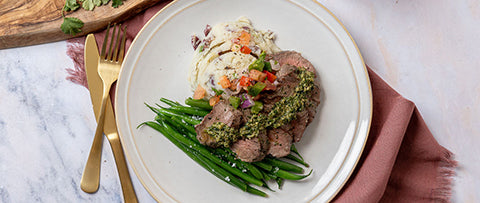Imagine ordering a big, juicy cheeseburger at the restaurant you’ve been craving just to find yourself feeling guilty for these decisions the rest of the day.
If you’re reading this, you probably have a love for food - but we all can admit, it’s not always the easiest relationship to manage. At some point in our lives, most people have dealt with some sort of unhealthy relationship with food.
For truly long-term health and weight management, addressing this relationship, consistently developing and fostering a healthy one, is in fact, JUST AS IMPORTANT as what we choose to put in our mouth in the first place.
What Is A Healthy Relationship with Food?
Our relationship with food involves a collection of thoughts, feelings and behaviors associated with food. It’s our emotional connection to the things we eat.
Let’s face it, we’re human beings and our emotions are connected to nearly every decision we make. That includes food we eat each and every day. We cannot live without food, so it makes sense how much our emotions go into these decisions.
A healthy relationship with food is one that’s positive. Looking forward to mealtimes and presently enjoying them with little reflection on if it was ok to eat afterwards.
What Does It Mean To Have An Unhealthy Relationship with Food?
On the other hand, an unhealthy relationship is not black and white. It can be very different from person to person and takes many forms. Some people might struggle with severe calorie counting and restriction. Others might find binge episodes in the evening their biggest obstacle.
Though these behaviors can vary widely, here are some common unhealthy mentalities many of us share:
Having food guilt.
This is the most common symptom and what we experienced above with our juicy burger example.
Food guilt is feeling bad about what we’ve already eaten. These feelings often consume us afterwards (digging into the past) or even begin during mealtimes (present). Guilty thoughts can interfere with the rest of our day-to-day life, making it hard to complete tasks at home and work or enjoy our loved ones the rest of the evening.
Feeling food anxiety.
Anxiety around food typically begins before consumption and builds as we get closer to mealtimes. It is associated with constant thoughts of “what am I going to eat?” and debating back and forth about “good” and “bad” foods.
Fear of judgment.
This includes outside influences, like being judged and what others are going to think of the choices we’ve made. Common thoughts like - “What will people think about me for choosing a burger over a salad?” If your decisions change based on the people around you, this might be something you want to work on.
If you find yourself relating to any or all of these unhealthy thoughts, here are a few simple steps to improve them.
3 Steps To Build A Healthy Relationship with Food
1. Ditch the rules.
Setting all these unrealistic rules about what you can and can’t have is just going to set you up for failure. It’s impossible to adhere to a laundry list of No’s, especially the more you make. And what happens when you “mess up”? It just makes you feel like a failure which doesn’t get us anywhere but convince ourselves we can’t “do it”. It’s all about balance. There are NO good and bad foods.
Instead, follow the fit-flavors 80/20 mentality—the majority of the time, choose foods that are healthy and wholesome for the body. 20% of the time, eat for enjoyment without calculating nutritional values or beating yourself up with the past.
2. Reflect on your food triggers.
This allows you to understand where your unhealthy thoughts, feelings and actions stem from in the first place. Understanding our own triggers will address any deep rooted beliefs around food. Reflecting on them allows you to understand why they are unnecessary and take steps to let them go.
If going out for ice cream always rocks you afterwards, ask yourself why this is occurring in the first place. What makes ice cream so much worse for you than other desserts? By reflecting, you will find out where this mentality stems from. For example, realizing these thoughts began at a young age with a family member teasing you about the amount of ice cream you ate. Fast forward a handful of years and not even realizing how much of an influence this memory has on your life now. Understanding how unnecessary these thoughts are will allow you to let them go.
If you find other people’s views consume you—remember you do not have to justify your food choices to anyone. The food that you choose to eat does not go into anyone else’s body but yours.
3. Forgive yourself.
When you start beating yourself up for not being perfect, ask yourself if this is productive to your health? If not, let it go. Take the energy you have towards beating yourself up and put it towards positive, actionable steps that propel you forward.
Instead of saying “why did I choose to eat that burger” say- “Ok, that was amazing. Now, I am going to get prepared for the next couple of meals” and take steps to make sure you have healthy foods available for the future.
In conclusion – let’s go easy on ourselves. We don’t have to get the healthiest choice on the menu every single time. Food isn’t just “good” or “bad”. It’s ultimately fuel for our bodies. Consider what foods provide better fuel for the body and choose these most often to feel your best. Recognize that it’s all about balance and give yourself permission to eat foods for enjoyment on occasion. Trying to control food too much actually allows the food control us. Likewise, feeling guilt about food just takes up space in the brain and drains us without any productivity.





